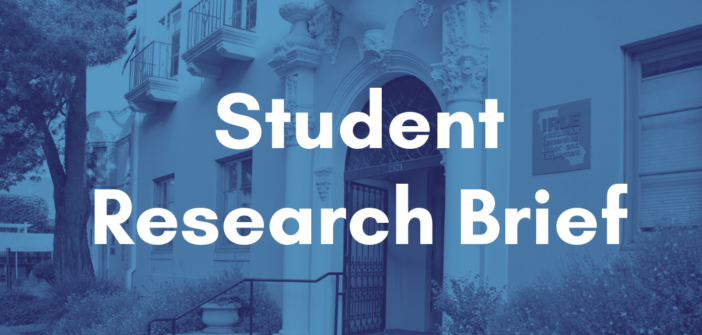This Student Research Brief is presented by University of California, Berkeley’s Undocumented Research Cohort members Erika Castano, Francisco Gonzalez, Angela Laureano, Keziah Aurin, Maria Dominguez, and Erika K. Cota.
Introduction
In the spring of 2019, the Undocumented Research Cohort (URC) set out to study the experiences of undocumented students at UC Berkeley (Cal). The URC was established to produce research about undocumented students by undocumented students, distinguishing this study from other research on the undocumented student experience. We began our study by surveying the resources available to undocumented students on campus, including fellowship and research opportunities, scholarships, academic advising, basic needs, and legal aid. Next, we conducted in-depth interviews with 25 undocumented students from different majors and with varying immigration statuses. The URC used snow-ball sampling to recruit respondents. We recruited students of diverse backgrounds, ages, ethnicities, and countries of origin.
One of the disparities that the Undocumented Research Cohort was keen to explore was the difference in experiences between students with and without Deferred Action for Childhood Arrivals (DACA) status. In 2012, President Barack Obama issued an executive order that created the DACA program. DACA provides temporary relief from deportation and work authorization to about 185,000 people in California alone. As a result, students with DACA are able to access more opportunities than their non-DACA counterparts.
We find that Cal fails to provide professional development opportunities to undocumented students, whether they have DACA or not. Students without DACA, however, are more likely to struggle to find paid work opportunities and scholarships on campus. Consequently, these students are forced into low-wage work that interferes with their ability to succeed academically. We also found that Cal does a poor job of preparing unDACAmented students for life after graduation. While the post-Cal future seems brighter for undocumented students with DACA, these students worry that their liminal status will be revoked; the risk of losing their DACA status keeps them in constant fear of the future. Thus, the lack of guidance and support affects both unDACAmented and DACAmented students.
We begin this report by documenting the barriers to accessing professional development opportunities while Next, we examine the availability of jobs and other paid opportunities for students with and without DACA status. Lastly, we explore the career advice available to undocumented students and the barriers they will likely face when they leave Cal. We end the report by outlining a series of recommendations for Cal to better support undocumented students.
